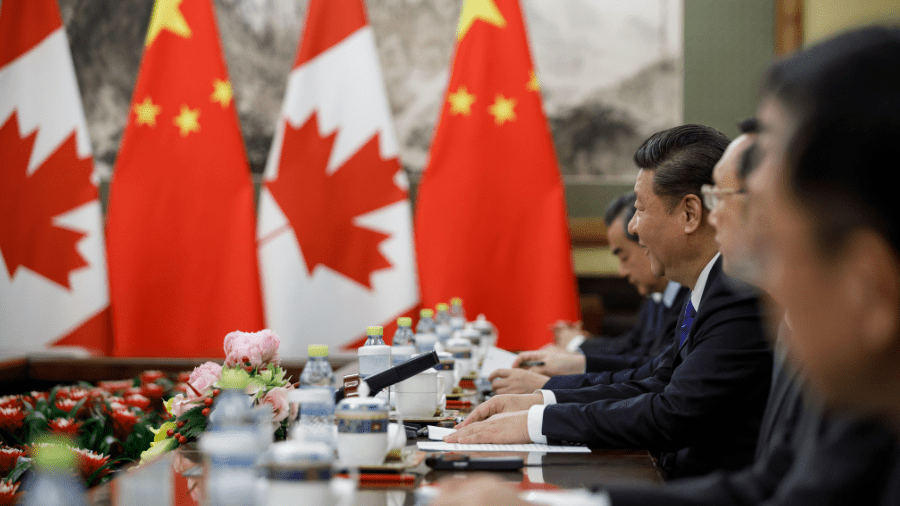This article originally appeared in the Financial Post.
By Jim Hinton and Matthew Bondy, July 18, 2023
In June, Canada’s finance minister, Chrystia Freeland, announced an immediate halt to the federal government’s participation in the Asian Infrastructure and Investment Bank, a Chinese-led outfit that notionally invests in roads and bridges throughout the Indo-Pacific to spur regional economic development.
Freeland’s announcement clearly foreshadowed a full withdrawal of participation in the organization.
The specific reasons for the abrupt pull-out remain unclear, but as Canadian Indo-Pacific scholar Jonathan Miller has written, this move recognizes a mistaken policy and the government of Canada deserves kudos for the change. AIIB was essentially a vector for Beijing’s global geopolitical ambitions, and after detaining Michael Spavor and Michael Kovrig for 1,019 days and bullying Canada’s prime minister at international forums, the AIIB opt-out at least nods in the direction of national self-respect.
However laudable the AIIB withdrawal is, it’s the tip of the iceberg for a much-needed reset on Sino-Canadian relations.
The best next step we can take is to get serious on protecting our institutes of higher learning from espionage, intellectual property (IP) theft and “partnerships” that render Canada an economic vassal state. Fifty Canadian universities have conducted extensive research with China’s military since 2005. That’s the same military that threatens regional instability across the Indo-Pacific and is credibly accused of supporting Russia’s war against Ukraine. Additionally, Huawei — the telecommunications arm of the Chinese Communist Party — has been permitted access to 20 of Canada’s research institutions with disastrous results.
Hundreds of millions of taxpayer dollars go into funding advanced research at Canadian universities every year. Thanks to these “partnerships” with Huawei, Canadian families have subsidized hundreds of patents for the telecom giant, which the Government of Canada has finally banned from helping to build our telecommunications networks on the grounds that it is a national security concern.
When Huawei gets these patents, they come with the economic rights that they use for Chinese economic benefit. China has gotten good at this: this is a systematic exfiltration of Canadian publicly funded assets to an organization that now isn’t even allowed in Canada’s and other allies’ networks, and it’s still happening today.
That’s the bad news. The good news is that Canada can get a handle on the situation by implementing a three-part playbook that draws from our American and Australian friends’ experiences.
First, we need transparency. We need to know exactly who is working with Canadian research institutions and how much they have been benefiting. Stunningly, we don’t currently have this information.
We also need to know what this technology has been used for. Particularly for dual-use technologies that may have commercial uses as well as nefarious purposes.
And we need universities receiving public funding to track and report the flow of research and development efforts with annual and concrete disclosure, including how much and who they are working with.
Second, Canada needs to communicate to universities that our domestic security institutions are in fact the good guys — not the bad guys — and that working with them is a good thing both for institutional reputation and the national interest. This principle of building the university-security institution relationship could include a version of Australia’s new law that enables its governments to cancel international contracts made by universities if they fly in the face of the national interest.
Third, Canada needs so, so much more education — throughout the academy, the civil service, and the economy in general — about the nature of the intangibles economy and how to win at it by generating and commercializing intellectual property.
This is especially pivotal because in the 21st century, economic and security risks are not separate issues — a principle referred to as civil-military fusion. IP and data assets for artificial intelligence, quantum computing, photonics, biotech and aerospace are dual-use technologies that have both economic and national security value. Net-benefit assessments in industry and in research agreements need to include both the economic potential and security risks.
These changes will help Canada become a predator rather than the prey on 21st century economic issues.
As it stands right now, China sees our universities as strategic IP generators for their military and firms. It has to stop. The federal government needs to take control of the situation and ensure that publicly funded intellectual property and data assets benefit Canadians, not hostile foreign militaries.
Matthew Bondy, MA, is a senior fellow with the Macdonald-Laurier Institute. Jim Hinton is an intellectual property lawyer with Own Innovation and an Assistant Professor at Western University.






